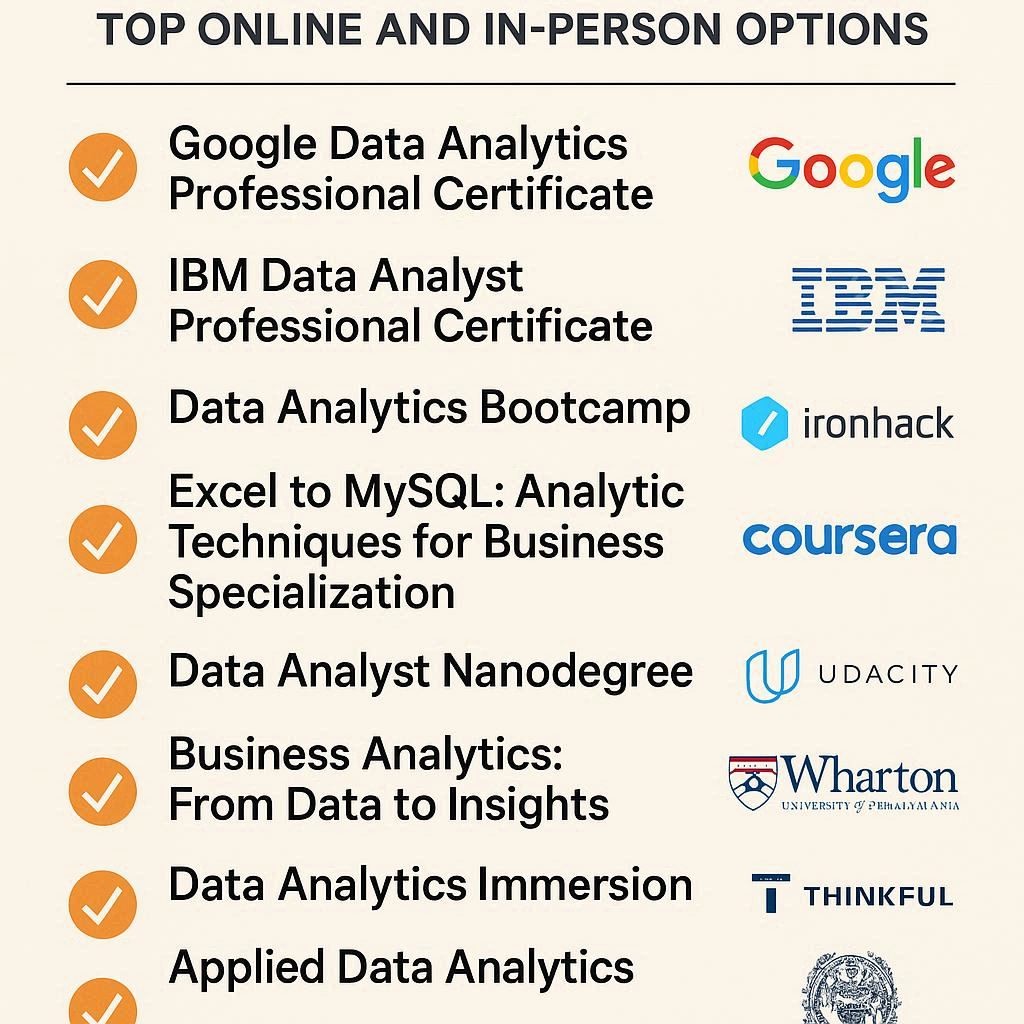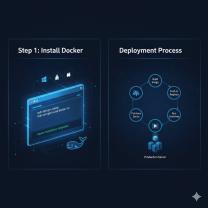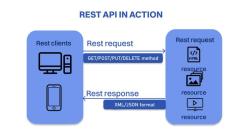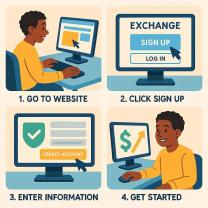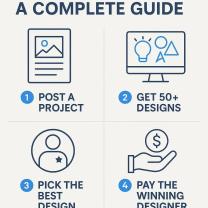What are the best data analytics courses?
Top Online Data Analytics Courses (2025)
1. Google Data Analytics Professional Certificate
Platform: Coursera
Duration: 6 months (10 hours/week)
Skills: R programming, SQL, Tableau, data cleaning, and visualization
Ideal For: Beginners aiming for entry-level data analyst roles
Cost: $49/month (7-day free trial available)
More Info: Coursera - Google Data Analytics
2. IBM Data Analyst Professional Certificate
Platform: Coursera
Duration: Self-paced (~3–6 months)
Skills: Excel, SQL, Python, data visualization
Ideal For: Aspiring analysts seeking a structured curriculum
Cost: $39/month (7-day free trial available)
More Info: Coursera - IBM Data Analyst
3. Data Analyst with Python Career Track
Platform: DataCamp
Duration: Self-paced (~6 months)
Skills: Python, SQL, data visualization, statistical analysis
Ideal For: Those preferring hands-on coding practice
Cost: Subscription-based
More Info: DataCamp - Data Analyst with Python
4. Master of Science in Business Analytics (MScBA)
Institution: Canadian University Dubai
Duration: Flexible (part-time options available)
Focus: Advanced data analytics skills for strategic leadership
Ideal For: Professionals aiming for leadership roles in data analytics
More Info: Canadian University Dubai MScBA
Top In-Person Data Analytics Programs (2025)
1. NYC Data Science Academy Bootcamp
Location: New York City & Live Online
Duration: 12 weeks
Skills: Python, R, SQL, Hadoop, Spark, Tableau
Ideal For: Individuals seeking intensive, immersive training
More Info: Course Report - NYC Data Science Academy
2. General Assembly Data Analytics Bootcamp
Location: Various U.S. cities & Online
Duration: 10–12 weeks
Skills: Excel, SQL, Python, data visualization
Ideal For: Career changers and beginners
More Info: General Assembly - Data Analytics Bootcamp
3. Springboard Data Analytics Career Track
Format: Online with 1:1 mentorship
Duration: 6 months (self-paced)
Skills: Python, SQL, Excel, data visualization
Ideal For: Professionals seeking personalized guidance
More Info: Springboard - Data Analytics Career Track
Summary Comparison
| Course/Program | Format | Duration | Ideal For | Cost |
|---|---|---|---|---|
| Google Data Analytics Professional Certificate | Online | 6 months | Beginners | $49/month |
| IBM Data Analyst Professional Certificate | Online | 3–6 months | Aspiring analysts | $39/month |
| Data Analyst with Python Career Track | Online | 6 months | Hands-on learners | Subscription-based |
| MSc in Business Analytics | In-person | Flexible | Professionals seeking leadership roles | Tuition-based |
| NYC Data Science Academy Bootcamp | In-person | 12 weeks | Intensive learners | Varies |
| General Assembly Data Analytics Bootcamp | In-person | 10–12 weeks | Career changers | Varies |
| Springboard Data Analytics Career Track | Online | 6 months | Professionals seeking mentorship | Tuition-based |
Best Data Analytics Courses Available Online
The best online data analytics courses often come from well-known institutions and tech companies. They are valued for their structured curricula, hands-on projects, and professional recognition. For beginners, the Google Data Analytics Professional Certificate is a top choice, covering a wide range of fundamental skills with a focus on practical application. The IBM Data Analyst Professional Certificate is another strong contender, offering a solid foundation with an emphasis on key tools. Other reputable providers include Coursera, edX, and DataCamp, which partner with universities and companies to provide specialized courses and career tracks.
Core Topics Covered in Analytics Programs
Data analytics programs are designed to equip students with a diverse skill set to transform raw data into actionable insights. Core topics generally include:
Data Collection and Management: Learning how to gather, store, and manage data from various sources, including an understanding of databases.
Data Cleaning and Preprocessing: This is a crucial step where you learn to handle missing values, correct errors, and format data for analysis.
Statistical Analysis: A foundational topic that covers descriptive statistics (e.g., mean, median) and inferential statistics (e.g., hypothesis testing) to draw conclusions from data.
Exploratory Data Analysis (EDA): The process of examining data sets to summarize their main characteristics, often using visual methods.
Data Visualization: The art of creating charts, graphs, and dashboards to communicate findings clearly and effectively.
Predictive Analytics and Machine Learning: More advanced topics that involve using statistical models and algorithms to forecast future trends or make predictions.
Comparing Certification and Degree Options
When choosing a path, consider your career goals, time, and budget.
Certifications: Professional certificates are an excellent option for those looking to quickly gain job-ready skills or upskill for a specific role. They are typically shorter (a few months) and more affordable than a degree. These programs are practical and project-based, allowing you to build a portfolio.
Degrees (Bachelor's or Master's): A traditional degree provides a comprehensive, in-depth understanding of the theoretical and mathematical foundations of data analytics. While more time-consuming and expensive, a degree can offer a competitive edge for senior-level or specialized roles and may be a requirement for some jobs.
Tools and Software Taught in Data Analytics Courses
Data analytics is a hands-on field, and courses focus on teaching a combination of programming languages, software, and business intelligence tools.
Programming Languages: SQL (Structured Query Language) is essential for working with databases, while Python and R are the industry standards for statistical analysis and machine learning.
Spreadsheets: Microsoft Excel is a fundamental tool for data cleaning, basic analysis, and visualization.
Data Visualization Tools: Tableau and Microsoft Power BI are leading platforms for creating interactive dashboards and visualizations that are easy to understand for non-technical audiences.
How to Apply Learning to Real-World Projects
The best way to solidify your skills and stand out to employers is by building a strong portfolio of projects. Don't just follow tutorials; find your own datasets and solve a problem.
Choose a meaningful dataset: Look for public datasets on platforms like Kaggle or from government websites. Find something that interests you, like analyzing movie data, crime statistics, or sales trends.
Follow the data analysis process: Start by defining your question, then acquire and clean the data. Next, perform your analysis and create visualizations. Finally, interpret your results and tell a story with your findings.
Document your work: Use a platform like GitHub to store your code and a blog or a personal website to explain your process, insights, and findings. This shows potential employers your thought process and problem-solving abilities.
